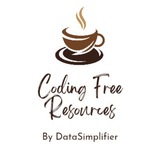Here's a step-by-step beginner's roadmap for learning machine learning:🪜📚
Learn Python: Start by learning Python, as it's the most popular language for machine learning. There are many resources available online, including tutorials, courses, and books.
Understand Basic Math: Familiarize yourself with basic mathematics concepts like algebra, calculus, and probability. This will form the foundation for understanding machine learning algorithms.
Learn NumPy, Pandas, and Matplotlib: These are essential libraries for data manipulation, analysis, and visualization in Python. Get comfortable with them as they are widely used in machine learning projects.
Study Linear Algebra and Statistics: Dive deeper into linear algebra and statistics, as they are fundamental to understanding many machine learning algorithms.
Introduction to Machine Learning: Start with courses or tutorials that introduce you to machine learning concepts such as supervised learning, unsupervised learning, and reinforcement learning.
Explore Scikit-learn: Scikit-learn is a powerful Python library for machine learning. Learn how to use its various algorithms for tasks like classification, regression, and clustering.
Hands-on Projects: Start working on small machine learning projects to apply what you've learned. Kaggle competitions and datasets are great resources for this.
Deep Learning Basics: Dive into deep learning concepts and frameworks like TensorFlow or PyTorch. Understand neural networks, convolutional neural networks (CNNs), and recurrent neural networks (RNNs).
Advanced Topics: Explore advanced machine learning topics such as ensemble methods, dimensionality reduction, and generative adversarial networks (GANs).
Stay Updated: Machine learning is a rapidly evolving field, so it's important to stay updated with the latest research papers, blogs, and conferences.
🧠👀Remember, the key to mastering machine learning is consistent practice and experimentation. Start with simple projects and gradually tackle more complex ones as you gain confidence and expertise. Good luck on your learning journey!
Learn Python: Start by learning Python, as it's the most popular language for machine learning. There are many resources available online, including tutorials, courses, and books.
Understand Basic Math: Familiarize yourself with basic mathematics concepts like algebra, calculus, and probability. This will form the foundation for understanding machine learning algorithms.
Learn NumPy, Pandas, and Matplotlib: These are essential libraries for data manipulation, analysis, and visualization in Python. Get comfortable with them as they are widely used in machine learning projects.
Study Linear Algebra and Statistics: Dive deeper into linear algebra and statistics, as they are fundamental to understanding many machine learning algorithms.
Introduction to Machine Learning: Start with courses or tutorials that introduce you to machine learning concepts such as supervised learning, unsupervised learning, and reinforcement learning.
Explore Scikit-learn: Scikit-learn is a powerful Python library for machine learning. Learn how to use its various algorithms for tasks like classification, regression, and clustering.
Hands-on Projects: Start working on small machine learning projects to apply what you've learned. Kaggle competitions and datasets are great resources for this.
Deep Learning Basics: Dive into deep learning concepts and frameworks like TensorFlow or PyTorch. Understand neural networks, convolutional neural networks (CNNs), and recurrent neural networks (RNNs).
Advanced Topics: Explore advanced machine learning topics such as ensemble methods, dimensionality reduction, and generative adversarial networks (GANs).
Stay Updated: Machine learning is a rapidly evolving field, so it's important to stay updated with the latest research papers, blogs, and conferences.
🧠👀Remember, the key to mastering machine learning is consistent practice and experimentation. Start with simple projects and gradually tackle more complex ones as you gain confidence and expertise. Good luck on your learning journey!
👍5
"Data Structures & Algorithms using Python"
This book of 222 pages implements all types of data structures and algorithms. And it's 💯 FREE.
Download Free: https://donsheehy.github.io/datastructures/fullbook.pdf
This book of 222 pages implements all types of data structures and algorithms. And it's 💯 FREE.
Download Free: https://donsheehy.github.io/datastructures/fullbook.pdf
👍2
Advanced Concepts in Operating Systems (Indian Edition).pdf
331.2 MB
Advanced Concepts in Operating Systems
Mukesh Singhal, 2008 (scanned)
Mukesh Singhal, 2008 (scanned)
🔥2👍1
Coding Projects in Python (DK).pdf
21.9 MB
Coding projects in Python
DK, 2017
DK, 2017
Practical Python Dat... by Ashwin Pajankar.pdf
4.8 MB
Practical Python Data Visualization
Автор: Ashwin Pajankar
Автор: Ashwin Pajankar
https_coderbooks_ruIntroduction_to_Data_Science_Data_Analysis_and.pdf
73.6 MB
Introduction to Data Science
Автор: Rafael A. Irizarry
Автор: Rafael A. Irizarry
🔥3
ebook-seo-sej-complete-guide-2018.pdf
13.5 MB
Seo full guide pdf ☠️
React for more ❤️
React for more ❤️
Data Structure Book by Yandyesh.pdf
12 MB
Complete DSA Book 📕 with simple & point wise explanations - 159 Pages ❤️
🔥3👍1
Python Data Stracture.pdf
4 MB
📖Data Structure Using Python 🔰
React ❤️🔥 for more
React ❤️🔥 for more
Python Pandas for Machine learning Notes.pdf
26 MB
Python Pandas for Machine learning Notes ❤️
🔥1
